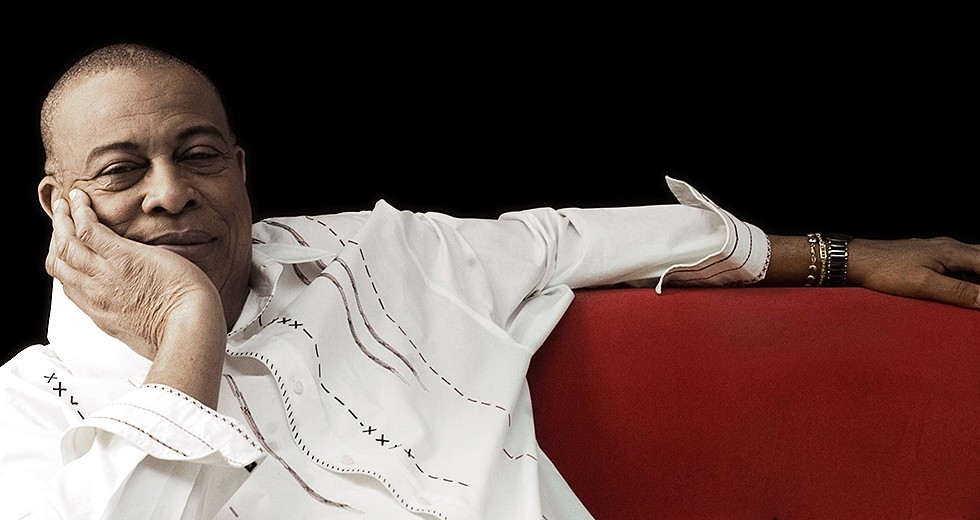
Though he just celebrated his 74th birthday, he’s bursting with the energy and enthusiasm of a teenager. And he infuses his music and those who perform it with those same qualities. Chucho Valdés, a five-time Grammy- and three-time Latin Grammy-winning pianist, composer and bandleader, is marking another milestone: an homage to his legendary ensemble, Irakere, on its 40th anniversary.
Forty years ago, “One Flew Over the Cuckoo’s Nest” won the Oscar for the best film, mood rings and Pet Rocks were all the rage, while “All in the Family” was the top-rated television series. Though in 2015, the 1970s might seem like a distant era, that decade saw the birth of Irakere — still contemporary 40 years later — an 11-piece, Cuban-style big band that drew its musical inspiration from jazz, rock, classical music and traditional Cuban music. Think of Art Blakey’s Jazz Messengers meets Blood, Sweat and Tears with an Afro-Cuban bent.
The group, organized by the then-thirtysomething Valdés, recruited players from Cuba’s Orquesta Cubana de Música Moderna, a large ensemble specializing in jazz and pop. Soon enough Irakere recorded “Bacalao Con Pan,” a piece that hinted at what was to come. For his current tour, which stops Nov. 6 for an SCP Jazz concert at Orchestra Hall, Valdés and his newly expanded Afro-Cuban Messengers are revisiting and reinterpreting the music of Irakere.
With U.S. and Cuba relations being what they were back then, the sounds of Irakere did not immediately reach American audiences. But four years after the group’s founding, a cruise ship carrying jazz luminaries Dizzy Gillespie, Earl “Fatha” Hines, and Stan Getz docked in Havana. They heard the group and were knocked out by the players’ virtuosity and imaginative writing. At their urging, the president of CBS Records took an interest, heard the group and soon signed Irakere for the Newport Jazz Festival, then presented in New York City.
In June 1978, Valdés and Irakere appeared at Carnegie Hall as “surprise guests” of the Newport Jazz Festival. Irakere didn’t go on stage until the end of the night, following legendary pianists Bill Evans and McCoy Tyner (both greatly admired by Valdés). The New York Times observed: “By the end of the evening, [the headliners] had almost been forgotten in the wake of an unannounced added attraction — Irakere, an 11-piece group from Cuba that had just been brought to New York by Columbia Records.”
Not bad for the band’s first American appearance.
A few months later, an album simply titled “Irakere,” which included tracks from the Carnegie Hall performance and a later appearance at the Montreux Jazz Festival, won the Grammy for Best Latin Recording.
Despite Valdés’ many albums, his energy and the sheer joy of his music-making cannot be fully comprehended from anything less than a live performance. A pianist with a formidable technique, he’s a former child prodigy who at age 3 could play the piano with both hands, and in any key, perform melodies he heard on the radio. By age 5, he was studying piano, theory and solfège (learning pitch by sight-singing). At 14, he graduated from the Conservatorio Municipal de Música de la Habana.
While he accomplished a great deal of his music education at the conservatory, he was initially schooled at home. His father, the renowned pianist and orchestra director Bebo Valdés (1918-2013), introduced him to the music of Duke Ellington, Count Basie and Glenn Miller. “He [Bebo] took me to see Nat King Cole, Erroll Garner and Sarah Vaughan when I was a child,” his son recalls. “You can’t imagine the effect that had on my life! It was enormous! Magical! My father taught me everything about Cuban music, South American music, jazz and how to work with an orchestra. He was my teacher. He still is.”
Through the years, Irakere’s personnel went through many changes, but Chucho Valdés always remained the anchor, the one great constant, as the group’s composer, arranger and musical director. Due to his involvement with the band, his talents as a pianist were largely overlooked. But in 1997, while still with Irakere, he played in the Roy Hargrove group Crisol and won a Grammy for his work on the Verve album “Habana.” Not long after, Valdés started appearing as a solo player and quartet leader; his name, however, will always be linked to Irakere.
Now, at 74, with an expanded version of his Afro-Cuban Messengers, he revisits those years of his incredible creative output. The Chucho Valdés: Irakere 40 tour is an unabashed celebration of the group that changed Latin jazz. The 10-piece ensemble (his Messengers plus three trumpets and two saxophones) delves into the Valdés oeuvre of the last four decades.
Of his ensemble, Valdés observes: “Now I have an extraordinary rhythm section that’s not only a foundation but a show in itself and I’m using them more as soloists. We have very, very strong brass and wind sections, and the writing is more detailed. It’s all more balanced. It makes the music new again.”
Making music new again is a fair summation of Valdés’ artistic life. As a recent review in the New York Times put it, “The force and charisma in his technique never really get old.” Or as Chucho tells it, “I’m always looking for new things.”
Jack Zimmerman, a longtime jazz aficionado, is a Chicago-based writer and novelist.